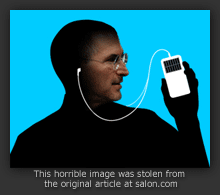Response to Cory Doctorow
 In response to Cory Doctorow’s “Steve Jobs’ iTunes dance”
In response to Cory Doctorow’s “Steve Jobs’ iTunes dance”
While i enjoy boingboing.net, i must say, co-editor Cory Doctorow should probably stick to what he’s good at. He writes a “response” of sorts to Steve Jobs’ Thoughts on Music that devolves fairly quickly into a misleading and misinformed diatribe about lock-in.
Here are some price moments:
Although Apple’s DRM is wholly ineffective at preventing copying […]
He’s got a typo, i think he meant to say: “Apple’s DRM is ineffective at wholly preventing copying” in which case he might actually have a point. Apple’s DRM does very well at discouraging casual copying, but it does not completely prevent a determined user (and does not attempt to, in the name of convenience.) Seeing as Apple allows DRM-less CDs to be burned, i don’t think anyone ever made the claim that Apple’s DRM would put an end to piracy.
Every iTunes song you buy for 99 cents amounts to a 99 cent tax on switching from an iPod to a Zune. That’s because your iTunes songs won’t play on your Zune — or on any other player, save those made or licensed by Apple.
And, also, just about every single CD player ever made. maybe worth mentioning. Also, after burning to a CD, you can simply re-encode to whatever Zune-friendly format you want. (…Which is how my cellphone plays my iTunes purchases. an extra step, sure, but it’s still possible, and pretty easy, without any 3rd party apps involved.)
Jobs tries to skate around this in his memo, suggesting that only a tiny fraction of the music on iPods comes from his music store, and so the anti-switching effects are minimal. […] If you’d bought just one iTunes track every month since the launch in 2003, you’d have rung up $82 in lock-in music. Throw in a couple of $9.99 albums and maybe an audiobook or two and you can easily find yourself in $150 down the lock-in hole.
Also, if i just pull numbers out of my ass, it’s much easy to support an argument! Did you know 82% of statistics are just made up?
Jobs’ DRM stance has historically been all over the map. […] Back in 2002, he went on the record with this gem: ‘If you legally acquire music, you need to have the right to manage it on all other devices that you own.’ But later, an Apple attorney told a tech conference that Apple would keep its DRM even if the labels asked to have it removed. And when Real announced that it had put a Real DRM player on Apple’s iPod so that you could listen to its DRM music on Apple’s player, Apple responded with legal threats.
So now Steve Jobs and Some Lawyer are the same person? He says that Jobs’ stance is all over the map, but apparently the only contradicting statement he could find wasn’t even said by Jobs.
Has Apple officially made a statement as such? or is EFF’s “i heard someone say no” enough evidence?
Apple’s legal-threat response to Real is essentially demanded by their agreement with the record companies, as outlined by Jobs’ Thoughts on Music: (“a key provision of our agreements with the music companies is that if our DRM system is compromised and their music becomes playable on unauthorized devices, we have only a small number of weeks to fix the problem or they can withdraw their entire music catalog from our iTunes store.“)
Jobs is the single largest shareholder in Disney/Pixar. Apparently, he forced himself to add DRM to his Pixar movies, turning a deaf ear to his own impassioned arguments to leave the DRM off.
I hadn’t realized that the single largest shareholder gets to disregard the board of directors and other shareholders, getting to do whatever he or she fancies. Steve Jobs is the single largest shareholder, but notably, not the majority shareholder; an important distinction that apparently Doctorow doesn’t really grasp.
Of course, it’s easy for Jobs to aver that he will drop DRM if the labels let him […] Jobs says the labels call the shots on DRM and forced him to add DRM to iTunes Music. So it’s hardly brave defiance to swear to take it off when the labels tell him to.
Doctorow’s whole point is that he “doubt[s] Jobs’ sincerity” in saying that he’ll drop DRM is the labels will let him. But now it’s not so much that Jobs’ wont do it, but that it’s not really that “brave”. I’m not sure Jobs’ “brave defiance” is really the point here.
DRM practically demands illicit copying. With DRM, the only way to get music that plays on all your devices, past and present, is to rip it off.
Again, where are CDs in this equation? I’ll admit, i haven’t purchased a CD in a few weeks, most of my recent music purchases have been from the generally better-priced, far-more-convenient, don’t-have-to-leave-the-house-or-wait-for-a-delivery iTunes Store. But contrary to his “DRM or Piracy” ultimatum, there is also legally purchasing a DRM-Free CD and encoding it in any way you see fit.
Let’s not get things twisted: i’m all for the downfall of DRM. Fair Use is a fundamental consumer right, and i’ll be the first person to pop open a bottle of cheap champagne when Apple announces the iTS will start selling music free from the shackles of DRM. What we don’t need is another tired and irrelevant argument about Apple’s iTunes and iPod’s supposed “vendor lock-in.”
of course, just as i finish writing this post, the Macalope weighs in. He (it?) does a nice job.
 the-ish.com/blog
the-ish.com/blog